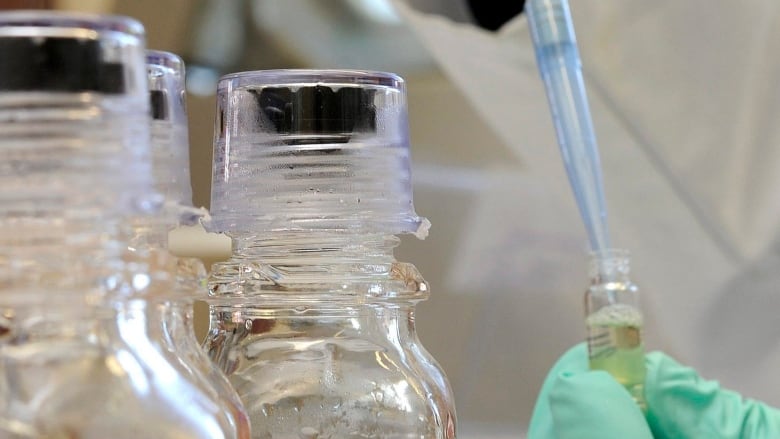Addiction specialists accused of 'massive conflict of interest' for ties to drug-testing industry
No doctor who profits from drug testing should assess workers with substance use disorders, nurses' groups say

Several organizations are highlighting potential conflicts of interest among a small group of B.C. doctors who specialize in assessing addiction while profiting from the drug-testing industry.
These physicians draw up return-to-work plans for people with substance use disorders in "safety sensitive" jobs like nursing, with requirements that may include testing them for drugs or alcohol at a cost of hundreds of dollars a month.
Thetests areoften performed by medical monitoring companiesand some of these companies are owned by those same physicians.
"Most of us have to pay crazy amounts of money to use the companies owned by the same group of doctors who dictate our return-to-work requirements," said Victoria nurse Rebecca Humberstone, who has been required to undergo drug testing for years after an evaluation by a doctor who owns one of these companies.
Humberstone is the co-founder of Workers for Ethical Substance Use Policy, one of several organizations arguing that doctors who perform independent medical examinations (IMEs) for substance use disorders should not profit from the medical monitoring industry.
They argue that even if a doctor isn't directly referring a patient to their own company, they're still propping up a sector they profit from.
"It's a relatively small group of doctors involved in the evaluations and reports stipulating treatment details, and they refer patients to each other's companies to avoid being accused of a conflict of interest," Humberstone argued.
The Harm Reduction Nurses Associationshares that view, and researchers from the B.C. Centre for Substance Use, B.C. Nurses' Union, Douglas College, University of Victoria and RainCity Housing raised similar red flags in a 2019 report that was made public this year.
"If an independent medical examination is required, this should be performed by a health-care provider that does not have any relationship to a monitoring company," the authors wrote.
Jonathan Chapnick, a workplace lawyer and consultant at Portage Legal Services and one of the authors of that paper, said cutting these financial ties is essential.
"That doctor will essentially spell out the next couple of years of the nurse's life," Chapnick said.
"We need to make sure that this exchange is free from conflict of interest, free from coercion."
There are no laws or regulations preventing a physician from buying into the drug-testing industry, butpractice standards laid out by the College of Physicians and Surgeons of B.C.state that doctors must "avoid, minimize, or manage and always disclose conflicts of interest."
College spokesperson Susan Prins said it would almost never be acceptable for a doctor to refer a patient to their own medical monitoring company.
But she went a step further than that.
"The college fully supports the perspective that in most circumstances, if an independent medical examination is required, this should be performed by a physician who does not have any relationship to a monitoring company," Prins wrote in an email.
'Somehow no one addresses it'
Some frank opinions of these financial connections are laid out in a 2019 research paper on a program for managing nurses with substance use disorders in an unidentified Canadian province.
One nurse told researchers she had been assessed by a doctor, with fees totalling $4,000, who then set the terms for her return-to-work contractincluding mandatory enrolment in the monitoring company he co-owned.
"That enrolment was $650 [per] month for three years," the nurse said, noting that her union paid for the first year, but she had to pay for the rest.
"They make a lot of money off nurses who are in their monitoring programs. ... It's a massive conflict of interest, and somehow no one addresses it."

It's not just nurses who have raised these allegations.
The Health Professions Review Board and labour arbitrators have also heard a handful of complaints from professionals including public transit workers and lawyers about addiction specialists and their connections to monitoring companies.
A 2017 review board decision involving a lawyer lays out a labyrinth of financial connections centred on two unnamed doctors he was required to see, their undisclosed business partnership, as well as their recommendations for a medical monitoring company and a counselling firm they both owned shares in.
'I can't support that conflict of interest'
In Humberstone's case, she was referred to Dr. Jennifer Melamed to undergo an IMEin 2016, during what she describes as a dark point in her life. Melamed's return-to-work planincluded mandatory medical monitoring, according to emails shared with CBC News.
Melamed and Dr. Maire Durnin-Goodman, another doctor who performs IMEs, are the directors of Precision Medical Monitoring based in Surrey, B.C., and have equal shares in the company, according to records from the B.C. Business Registry and the company's central securities register.
In an emailed statement, Precision's program administrator Dr. Alan Brookstonesaid the company "takes seriously its responsibility to be compliant with the college's standards" on conflict of interest, but referred further questions to the college.
Meanwhile, Dr. Robert Baker is one of three partners in Arbutus Work Solutions, another medical monitoring company in Kamloops, B.C., and also performs IMEs. Representatives of the company have not responded to requests for comment.
And two other physicians who specialize in addiction were co-directors of Alliance Medical Monitoring in Burnaby, B.C., until 2016, when they gave up their positions and financial interest in the company, records show.

Chapnick, the workplace lawyer, said he's also aware of some doctors who might not own medical monitoring companies but still offer paid drug-testing services through their practices.
Humberstone wasn't required to use Melamed's company for her drug testing, and instead turned to a Victoria-based company that does not appear to have any connection to IME physicians.
But it's been an expensive process for her. Humberstone said the union paid for her first year of monitoring and her insurance covered another year, but the rest has been out of pocket.
She recently learned that Island Health, her employer, will now cover employees' drug-testing expenses, but only if they use the medical monitoring company the health authority hassigned a contract with.
That company is Precision Medical Monitoring, owned by Melamed and Durnin-Goodman.
"I'm still paying out of pocket because I can't support that conflict of interest," Humberstone said.
"The two doctors who own Precision Medical Monitoring knew full well that by securing this contract with Island Health there would be employees they had evaluated and required to be medically monitored who would be made to use their company."
Island Health confirmed the existence of the contract for CBC News, but a spokesperson said questions about potential conflicts of interest should be directed to the college.












_(720p).jpg)


 OFFICIAL HD MUSIC VIDEO.jpg)
.jpg)



























































































